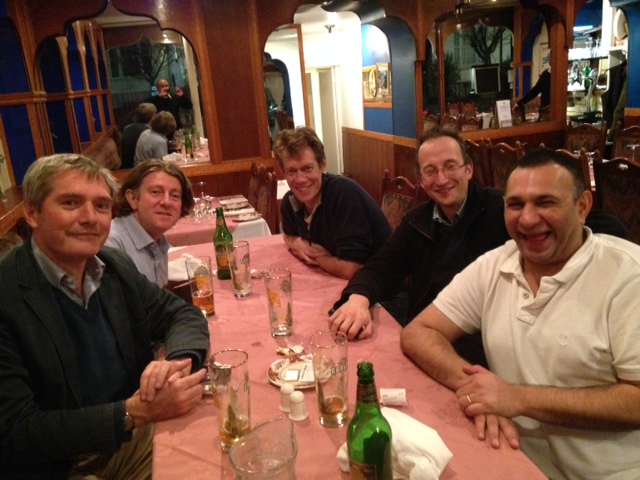Henry Goulding
Henry Goulding died last month. I went to school with Henry, but we were not in touch for many years afterwards. Until in November 2014 when I received an email from him, out of the blue. In it was this photograph, and just the words, “A point for each name. I hope all is well with you.” I recognized Henry (on the left) and other school friends (though I failed to name them all). This began a short correspondence: we discovered the outline of each others life (“solicitor, ... married with three kids, GBG: 16, 11 and 9...”), and Henry expressed a hope to meet me some time in London (I was living in Indonesia in 2014). He didn’t tell me then that he was suffering from cancer, but the following April he mentioned “chemo.” I was back in the UK and we were arranging a time to meet.
I remember clearly the warm spring day at Covent Garden tube station. It was after work, and people were pouring out of the street exit, jackets off, shirtsleeves rolled up. I was not sure I would recognize Henry in person. But I did, with relief, and we set off for a nearby restaurant (Belgo Centraal: Belgian mussels and fries!). Over a lengthy dinner in the bustling, neon-lit eatery we shared our news and reminisced. Henry explained his cancer, which had already been with him for a while. There was a striking wisdom about him as he talked about life. He seemed profoundly happy with his story (his family, his job), but appeared not to be grasping it too tightly. And the kindness I remember from school had deepened and matured. I am very grateful to have had that chance to see him again.
During our conversation, Henry mentioned a book he was working on (‘A Hawk in the Sky’). It was a memoir about his father, told through the entries in his father’s birding ‘life list.’ Henry’s father, Sir Marrack Goulding, was a distinguished British diplomat who watched birds with dedication during his travels around the world. Henry already shared that passion for birdwatching when I knew him at school, and I clearly remember thumbing through his National Geographic Field Guide to the Birds of North America, with the imperious bald eagle on the front cover. In September (2015) Henry sent me a partial draft of his book. He had promised it to me, but was typically self-depreciating, ending his email, “Anyway, read a little bit and then press delete.” I read the beginning, thanked him, and promised in turn to read it all. That was our last contact. I had just moved to Alaska and was wrapped up in my own life story.
...
A couple weeks ago I was paging through my Kindle and found Henry’s manuscript. I resolved to read it, and to send Henry a card wishing him well. I finished it this morning. The writing is superb, full of evocative descriptions of birds and landscapes, and gentle but penetrating insights into growing up and into Henry’s relationship with his father. It is suffused with wistfulness and a generous spirit.
After finishing the final page, I googled ‘Henry Goulding London,’ with some trepidation. Indeed... I found his obituary immediately. Henry had just died on the 19th of this May.
I can’t tell him now how much I enjoyed his book, and how grateful I am that he got in touch with me after thirty years. But I can share these words of his:
“Both the Black Wheatear and, later, the Ring Ouzel were just about the most perfect things to see. It is difficult to explain why but the right bird in the right place is a sign of our place on this planet, how the natural order should work, what designs (thinking or otherwise) there are for us and a reassurance, at the most elemental level, that life goes on. It is, for those of us that use it as such, a safety net (a safety valve sometimes) and a reminder that, despite all our actions, there is an infinitely greater and more rhythmic pattern afoot that provides us with the necessary perspective to interpret our own existence and actions. Life is older and better than we know it to be and, to borrow from MacNeice again, it is incorrigibly plural. The Black Wheatear, the Ring Ouzel, they are yet one more celebration of this existence, a reminder of what else lies out there and, by extension, an invitation to further enquiry and exploration.”
Thank you, universe, for the life of Henry Goulding.

